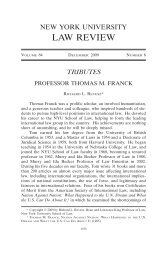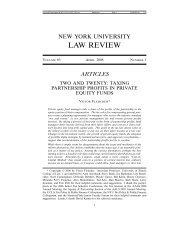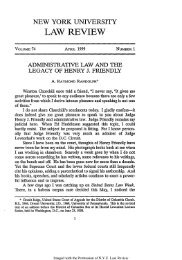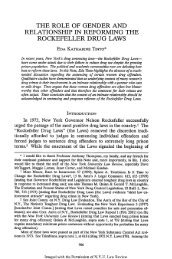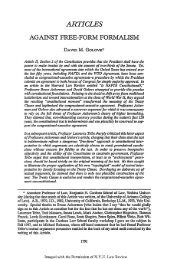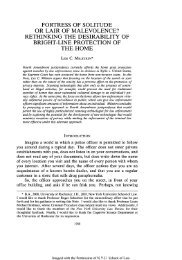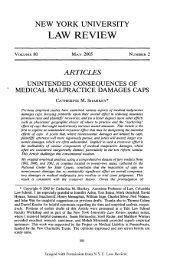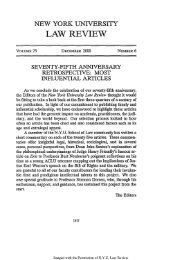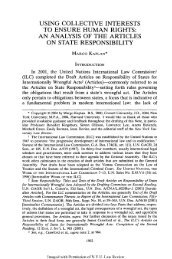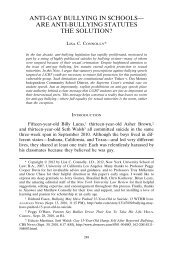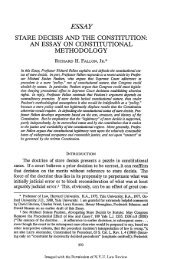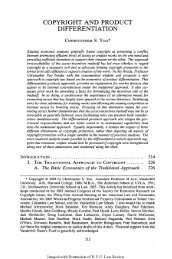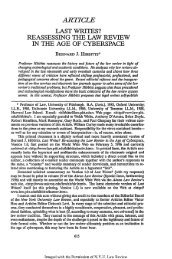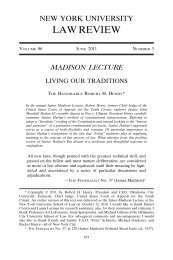Immigrants and the Right to Petition - NYU Law Review
Immigrants and the Right to Petition - NYU Law Review
Immigrants and the Right to Petition - NYU Law Review
You also want an ePaper? Increase the reach of your titles
YUMPU automatically turns print PDFs into web optimized ePapers that Google loves.
Imaged with <strong>the</strong> Permission of N.Y.U. School of <strong>Law</strong><br />
NEW YORK UNIVERSITY LAW REVIEW<br />
[Vol. 78:667<br />
greement with <strong>the</strong> distinction between "people" <strong>and</strong> "person," not <strong>to</strong><br />
mention <strong>the</strong> extraterri<strong>to</strong>rial circumstances of <strong>the</strong> search at issue in<br />
Verdugo-Urquidez, should have limited <strong>the</strong> impact of <strong>the</strong> decision.<br />
But Chief Justice Rehnquist's opinion has had very real consequences<br />
for noncitizens physically resident within <strong>the</strong> United States.<br />
Since Verdugo-Urquidez, federal <strong>and</strong> state courts have treated<br />
<strong>the</strong> applicability of <strong>the</strong> First <strong>and</strong> Fourth Amendments <strong>to</strong> legal <strong>and</strong> illegal<br />
noncitizens as unsettled, 75 <strong>and</strong> in several cases, <strong>the</strong> U.S. Department<br />
of Justice has argued that nei<strong>the</strong>r <strong>the</strong> First nor Fourth<br />
Amendment applies <strong>to</strong> undocumented persons. 76 The Verdugo-<br />
Urquidez statements may have contributed <strong>to</strong> <strong>the</strong> Court's subsequent<br />
rejection of First Amendment arguments by immigrants singled out<br />
for deportation based on <strong>the</strong>ir disfavored speech <strong>and</strong> associational activities.<br />
77 And <strong>the</strong>y may have emboldened Congress <strong>to</strong> restrict First<br />
(criticizing "substantial connection" test of Verdugo-Urquidez as "inconsistent"); Joseph<br />
Ricchezza, Note, Are Undocumented Aliens "People" Persons Within <strong>the</strong> Context of <strong>the</strong><br />
Fourth Amendment, 5 Geo. lmmigr. L.J. 475, 499 (1991) (labeling range of opinions in<br />
Verdugo-Urquidez "[a] morass").<br />
75 See United States v. Barona, 56 F.3d 1087, 1093-94 (9th Cir. 1995) (observing that<br />
after Verdugo-Urquidez, applicability of Fourth Amendment even <strong>to</strong> lawful resident aliens<br />
is "yet <strong>to</strong> be decided"); United States v. Guitterez, 18 Immigr. Rep. (MB) A3-26, A3-31<br />
(N.D. Cal. 1997) (citing Verdugo-Urquidez in denying motion <strong>to</strong> suppress on grounds that<br />
criminal defendant was undocumented immigrant <strong>and</strong> not covered by Fourth Amendment),<br />
available at 1997 U.S. Dist. LEXIS 16446, *16-17, vacated, 983 F. Supp. 905, 912-16<br />
(N.D. Cal. 1998) (reversing prior ruling <strong>and</strong> holding undocumented defendant may invoke<br />
Fourth Amendment), rev'd on o<strong>the</strong>r grounds, 203 F.3d 833 (9th Cir. 1999) (unpublished<br />
table decision), available at 1999 U.S. App. LEXIS 32230; Torres v. State, 818 S.W.2d 141,<br />
143 n.1 (Tex. Crim. App. 1991) (citing Verdugo-Urquidez <strong>and</strong> holding undocumented defendant<br />
may not raise Fourth Amendment objection <strong>to</strong> search or seizure), rev'd en banc on<br />
o<strong>the</strong>r grounds, 825 S.W.2d 124 (Tex. Crim. App. 1992).<br />
76 See, e.g., Am.-Arab Anti-Discrimination Comm. v. Reno, 70 F.3d 1045, 1056 (9th<br />
Cir. 1995) (rejecting INS argument that "<strong>the</strong> foreign policy powers which permit <strong>the</strong> political<br />
branches great discretion <strong>to</strong> determine which aliens <strong>to</strong> exclude from entering this country<br />
. . . authorize those political branches <strong>to</strong> subject aliens who reside here <strong>to</strong> a<br />
fundamentally different First Amendment associational right"), vacated on o<strong>the</strong>r grounds,<br />
525 U.S. 471 (1999); Guitterez, 983 F. Supp. at 911 ("[T]he Government argues that in <strong>the</strong><br />
context of illegal or undocumented aliens courts are required <strong>to</strong> determine, as a threshold<br />
matter, whe<strong>the</strong>r a criminal defendant has a sufficient 'connection' <strong>to</strong> <strong>the</strong> United States so<br />
as <strong>to</strong> fall within <strong>the</strong> ambit of <strong>the</strong> Fourth Amendment.").<br />
77 Some have described <strong>the</strong> Court's decision in Reno v. American-Arab Anti-Discrimination<br />
Committee, 525 U.S. 471 (1999), which held that a claim of selective enforcement in<br />
immigration proceedings generally must be raised only in administrative proceedings, as<br />
indicating that immigrants lack First Amendment rights. See Maryam Kamali Miyamo<strong>to</strong>,<br />
The First Amendment After Reno v. American-Arab Anti-Discrimination Committee: A<br />
Different Bill of <strong>Right</strong>s for Aliens, 35 Harv. C.R.-C.L. L. Rev. 183, 205 (2000) ("[In Reno<br />
v. American-Arab Anti-Discrimination Committee, <strong>the</strong> Court] implied that aliens who were<br />
unlawfully present in <strong>the</strong> United States did not enjoy <strong>the</strong> protection of <strong>the</strong> First Amendment.").<br />
But see Gerald L. Neuman, Terrorism, Selective Deportation <strong>and</strong> <strong>the</strong> First<br />
Amendment After Reno v. AADC, 14 Geo. lmmigr. L.J. 313, 314 (2000) ("Although it is<br />
possible that members of <strong>the</strong> majority do believe that <strong>the</strong> First Amendment does not sig-



